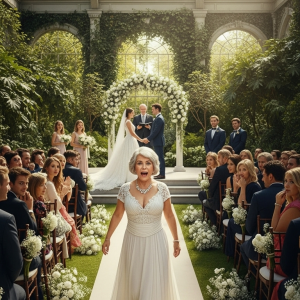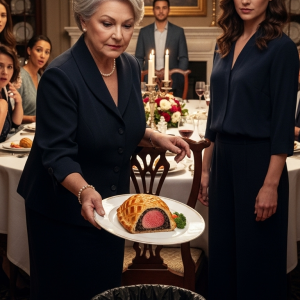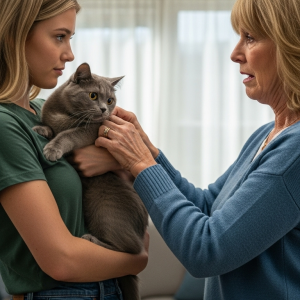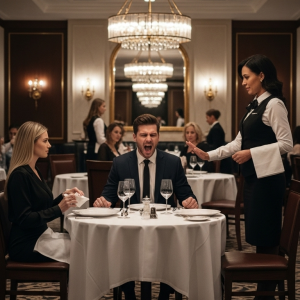The library of Arthur Sterling was not a room; it was a world. It smelled of old leather, decaying paper, and the faint, sweet aroma of the pipe tobacco he had loved. For Elara, it was the heart of the house, the heart of her childhood. For her cousins, Mark and Jessica, who now stood impatiently by the grand fireplace, it was just a collection of dead wood on prime real-estate.
“Look at all this dusty junk,” Jessica whispered to her brother, her voice a sharp, grating sound in the cathedral-like silence. “I bet the land this monstrosity sits on is worth fifty million alone. The first thing I’m doing when this is over is calling a developer.”
Mark, a man whose soul was a spreadsheet of assets and liabilities, nodded in agreement. “The old man’s folly,” he said, gesturing to the floor-to-ceiling shelves. “Think of the carrying costs. All this could have been liquidated and invested in a high-yield fund years ago.”
Elara heard them, but she didn’t react. She was too busy grieving the man who had built this world. Her grandfather, the renowned but famously eccentric Professor Arthur Sterling, had been her only true ally in a family that valued stock portfolios over stoic philosophy. While her cousins had gone to business school and climbed the corporate ladder, she had pursued a Ph.D. in Classics, a choice her family had openly mocked as a “useless, unmarketable degree.” Only Arthur had understood.
“Let them count their money, Elara,” he had told her once, his eyes twinkling as they sat in this very room. “The real treasure isn’t in a bank vault. It’s in these pages. It’s the knowledge that lasts. Remember that.” He would often pepper their conversations with Latin phrases, winking at her as Mark and Jessica rolled their eyes at his “eccentricities.” It was their secret language, a bond forged in a world of epic poems and ancient history that her cousins could never, and would never, want to enter.
Now, on the day of his will reading, their victory seemed assured. They would inherit the fortune, and she would be left with the dusty memories. She didn’t care about the money. She just prayed they wouldn’t bulldoze the library.
The family lawyer, Mr. Davies, a man as old and dry as the legal tomes that lined his own office, entered the room carrying not a modern, typewritten document, but a heavy, leather-bound journal. He placed it on the grand oak desk with a soft, reverent thud.
“This,” he announced, his voice echoing in the high-ceilinged room, “is the last will and testament of Professor Arthur Sterling. It is entirely in his own hand.” He paused for dramatic effect. “And it is written entirely in Classical Latin.”
A sharp, incredulous laugh erupted from Mark. Jessica joined in, a sound like tearing silk. “Latin?” Jessica scoffed. “The old man really did lose his mind at the end, didn’t he?”
She turned to Elara, her eyes gleaming with malicious pity. “Well, I suppose this is your moment to shine, cousin. See if that ‘useless’ degree of yours can translate this nonsense. Maybe he left you a few of these dusty books as a souvenir.”
Mr. Davies looked at Elara, a neutral expression on his face. “As the only party present with the requisite expertise, Ms. Sterling, would you do us the honor?”
Elara felt a flush of anger at her cousins’ disrespect, but she pushed it down. She approached the desk, her heart heavy. She traced the vellum cover with a gentle finger, the familiar scent of her grandfather rising to meet her. This was not a legal document to her; it was the last conversation she would ever have with him.
She opened the journal. The ink was a deep, rich brown, the script a beautiful, flowing cursive. She took a deep breath and began to read aloud, her voice soft but clear, first in the original Latin, and then in English.
“Ego, Arthur Sterling, sanae mentis et memoriae…” she began. “I, Arthur Sterling, being of sound mind and memory…”
For the first few pages, the text was what she expected: philosophical musings on life and death, expressions of love for his family, and fond farewells. Her cousins were sighing with theatrical boredom. Mark was already scrolling through stock futures on his phone.
“Get on with it, Elara,” he grumbled. “We don’t need a lecture on dead poets. Just find the part with the dollar signs and let’s all go home.”
But then, Elara’s voice faltered. She had come to a passage that made the hairs on her arms stand up. It was no longer a simple farewell. It was a puzzle. A game. A treasure hunt designed only for her.
“Meam veram hereditatem,” Elara read, her voice trembling slightly, “ei soli lego qui eam invenire potest… To the one who can find it, I leave my true inheritance…”
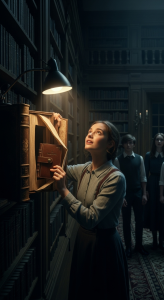
Her eyes flew across the page, her mind, trained for this very purpose, recognizing the allusions, the clever, literary breadcrumbs her grandfather had left for her.
“Thesaurus meus maximus,” she translated, her heart now hammering in her chest, “iacet ubi aquila primum nidum posuit. My greatest treasure lies where the eagle first nested.”
Jessica let out a loud, impatient sigh. “An eagle’s nest? Is he serious? Are we supposed to go hiking now?”
But Elara wasn’t listening. Her mind was racing. The eagle. The symbol of Rome. The symbol of the legions, of the empire. And where did it first nest? Not a literal nest. A literary one. The founding myth. The epic poem that told the story of the birth of the Roman people, carried from the ashes of Troy.
“The Aeneid,” she whispered, her voice full of a dawning, breathtaking understanding.
She stood up and walked, as if in a dream, to the section of the library dedicated to epic poetry. Her fingers traced the leather spines: The Odyssey, The Iliad, and there it was. A magnificent, centuries-old, vellum-bound edition of Virgil’s Aeneid. It was her grandfather’s most prized possession.
“What is she doing?” Mark demanded, finally looking up from his phone.
With trembling hands, Elara lifted the heavy volume from the shelf. It felt different. Heavier than it should. She ran her fingers along the inside cover and found it: a tiny, almost invisible seam. She worked her nail into the gap and the false front of the book’s binding came away, revealing a hollowed-out cavity. And nestled inside was another, smaller, leather-bound book. A ledger.
Elara carried the ledger back to the desk as if it were the holy grail. Mark and Jessica were on their feet now, their boredom finally replaced by a confused, suspicious curiosity.
She opened the ledger. The pages were not filled with poetry, but with numbers, with inventories, with legal documents. The first page was a deed of ownership for a private, highly respected, and extremely profitable auction house in New York that specialized in rare books and classical antiquities: “Sterling Antiquities.” An auction house none of them even knew existed.
Page after page detailed the assets: a climate-controlled warehouse in Geneva holding a collection of Roman statuary, first-edition copies of works by Ovid and Seneca, a portfolio of Greek coins so rare it would make a museum curator weep. The total estimated value listed on the final page was a number with nine figures.
Elara looked up, her eyes blurred with tears, not from the monetary value, but from the sheer, brilliant audacity of her grandfather’s secret life.
It was then that Mr. Davies, who had been watching the entire scene with a calm, knowing smile, finally spoke.
“And now,” he said, picking up the vellum will and turning to the final page, “for the concluding provision.” He looked directly at Elara. “Quicumque hanc aenigma solvit, heres meus verus erit. ‘Whosoever solves this puzzle, shall be my true heir.’ Congratulations, Ms. Sterling. By an act of intellect and understanding, you have just inherited your grandfather’s true legacy in its entirety.”
The silence in the room was absolute. Mark and Jessica stood frozen, their faces a ghastly, contorted mask of disbelief, then envy, then pure, unadulterated horror. They had been in the same room, had heard the same words, but their own ignorance had rendered them deaf and blind to a fortune of a hundred million dollars.
“And what about us?” Jessica finally choked out, her voice a strangled whisper.
Mr. Davies adjusted his glasses and read the very last lines. “And to my grandchildren, Mark and Jessica, whose interests have always been more practical, I leave the sum of ten thousand dollars each,” he recited, his voice flat. “It is my sincerest hope that they use it to buy some good books, and for the first time in their lives, actually read them.”
The destruction of Mark and Jessica’s arrogance was a quiet, internal collapse. They left the library that day not with a bang, but with a whimper, the weight of their own monumental, self-inflicted loss crushing them. The story of how they had been disinherited by a dead language and their own willful ignorance became a cautionary tale whispered in the elite circles they had once so proudly occupied.
For Elara, the inheritance was not an end, but a beginning. It was a vindication of her life’s passion, a final, loving gift from the only person who had ever truly understood her. She did not sell the collection. She did not liquidate the assets. She stepped into her grandfather’s secret world and made it her own.
Under her leadership, Sterling Antiquities became not just a profitable auction house, but a world-renowned center for classical scholarship. She used her position to fund archaeological digs, to digitize ancient texts, and to repatriate artifacts to their countries of origin. She was not just a businesswoman; she was a curator of history, a guardian of the legacy her grandfather had so carefully built.
A year later, at a press conference that was live-streamed to universities around the globe, she made her most important announcement.
“My grandfather believed that the greatest treasures are not objects to be owned, but knowledge to be shared,” she said, standing at a podium, the proud portrait of Arthur Sterling behind her. “In his honor, Sterling Antiquities is proud to announce the establishment of the Arthur Sterling Scholarship for the Humanities, a fifty-million-dollar endowment to fund students in Classics, history, and literature around the world.”
She had proven that her “useless” degree, the one her family had mocked, was not only the key to a vast fortune but the foundation for a global legacy of learning. She looked out at the sea of hopeful, intelligent faces in her audience and knew she had honored her grandfather’s will in the most perfect way imaginable. She had taken the treasures from the pages of his books and had given them back to the world.
Of course. Here is a 1000-word continuation of the story, exploring the divergent paths of the heirs and the true meaning of Arthur Sterling’s legacy.
In the months that followed the reading of the will, the lives of Arthur Sterling’s grandchildren diverged as dramatically as two rivers flowing from a single mountain peak—one towards a vast, sunlit ocean, the other into a stagnant, bitter marsh.
For Mark and Jessica, the world had become a landscape of quiet humiliation. They sat in the sterile, glass-walled conference room of Mark’s investment firm, a space that now felt less like a seat of power and more like a mausoleum for their ambitions. Between them, on the polished chrome table, lay two uncashed checks from their grandfather’s estate. Ten thousand dollars each. The sight of them was a constant, simmering insult.
“It’s the sheer arrogance of it that kills me,” Jessica hissed, her voice a low, venomous whisper. “‘Buy some good books.’ He was mocking us, even from the grave. While she,” the name Elara was left unspoken, a sour taste in the air, “is probably bathing in champagne and reading Virgil.”
“The lawyers said it’s airtight,” Mark grumbled, staring at a stock ticker on his screen as if hoping it might offer a different answer. His firm had taken a hit; he had leveraged heavily against his expected inheritance, and the sudden lack of capital had forced him to sell off several promising assets at a loss. “The Trust is a separate legal entity. The will just… activated her position within it. It’s a work of diabolical genius. He weaponized her uselessness against us.”
They were trapped in the wreckage of their own worldview. They had spent their lives believing that knowledge was only valuable if it could be monetized, that their practical, cutthroat ambition made them superior. Yet, they had been defeated by a dead language and the quiet, bookish cousin they had always pitied. They had been standing in a treasure room, complaining about the decor, while Elara was calmly reading the map that led to the vault. The ten-thousand-dollar checks remained on the table, a tangible symbol of all they had failed to understand.
Meanwhile, Elara was discovering that her grandfather’s “true legacy” was even vaster and more complex than she had imagined. Sterling Antiquities was not just a business; it was a cultural institution, a secret bridge between the academic world and private collectors, built on Arthur’s peerless reputation for integrity and his uncanny eye for authenticity.
She spent her first few months not in a boardroom, but in the climate-controlled vaults beneath the New York gallery, getting to know the collection. She would run her fingers over the cool, veined marble of a Roman bust, her academic knowledge giving the object a story, a context that a simple appraisal could never capture. She found she had a natural aptitude for the work, a combination of her grandfather’s scholarly rigor and a newfound business acumen she never knew she possessed.
She didn’t just run the auction house; she transformed it. The auction catalogs, once dry inventories of lots and estimates, were now beautiful, scholarly publications, filled with historical essays she commissioned (and sometimes wrote herself). She insisted on a new level of transparency in an industry often shrouded in secrecy, a move that initially ruffled feathers but quickly earned the deep respect of museums and serious collectors worldwide.
One afternoon, she was overseeing the final arrangements for the upcoming “Augustan Age” auction. A junior curator approached her, his face alight with excitement. “Dr. Sterling, the response to the scholarship announcement has been… overwhelming. We’ve received over five thousand applications from sixty countries for the first ten slots. The letters we’re getting… these kids are just like you were. They thought the world had no place for them.”
Elara smiled, a genuine, unburdened smile. She looked at a first-edition copy of Horace’s Odes lying open on a velvet cloth, its timeless verses a quiet testament to the enduring power of the humanities. The money was a tool, but this—this was the purpose. This was the interest payment on her grandfather’s true investment.
A year after the will reading, Elara stood in the familiar, comforting silence of her grandfather’s library. The room was unchanged, but she was not. She was no longer the quiet, grieving granddaughter, but the confident custodian of a global legacy. She was there to meet the inaugural class of the Arthur Sterling Scholars.
A young woman with bright, intelligent eyes and a nervous energy stepped forward to shake her hand. Her name was Maria, the daughter of immigrant farm workers from California’s Central Valley. She was the first in her family to attend college and had been accepted into the Classics Ph.D. program at Princeton, an achievement made possible only by the scholarship.
“Dr. Sterling, I… I don’t even know what to say,” Maria stammered, her gaze sweeping around the magnificent library. “I’ve dreamed of rooms like this. I read your new foreword in the latest auction catalog, the one about the provenance of the Livy manuscript. Your analysis of the textual variants was brilliant.”
Elara felt an instant connection, a kinship that transcended wealth and status. She saw her younger self in this brilliant, passionate student. They spent the next hour not as benefactor and recipient, but as two scholars, eagerly discussing the nuances of Tacitus and the political subtext of Catullus.
“My family thought I was crazy,” Maria admitted with a small laugh. “They wanted me to study business. They said, ‘What can you do with Latin except talk to dead people?’ But your grandfather… he must have understood.”
“He understood that the dead have a great deal to teach us about how to live,” Elara said softly. She walked over to the grand portrait of Arthur that now hung over the fireplace. He looked down at the room, a knowing, almost mischievous glint in his painted eyes.
She had found her calling, not in the dusty pages of the past, but in using that past to build a vibrant, living future. The library was no longer a silent monument to a man who was gone; it was a humming, active center of a legacy that was just beginning. She had inherited a fortune, but her grandfather’s truest gift had been the wisdom to see that its real value was not in keeping it, but in giving it away. She had solved his final, greatest puzzle, and the answer was not a number in a ledger, but a room full of bright, hopeful minds, ready to carry the torch of knowledge into the future.
